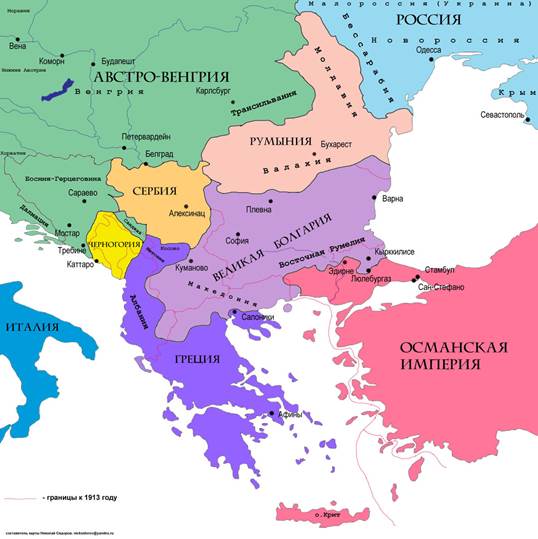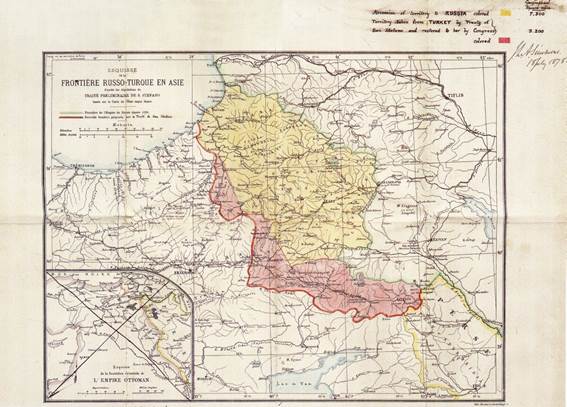A Little History Lesson or Why Bulgaria “Went the Other Way”
The study of history very often gives interesting clues, it has parallels that allow us to understand a lot in modern times. Me, basically. against war, it does not bring anything good, but. Sometimes it’s unavoidable. In both Patriotic Wars, it turned out like this: “We were attacked. But we won.” But, having won, we did not stop at our borders (neither in 1812, nor in 1944-45). Why?
Why did the USSR, having won the Great Patriotic War and reached its former borders, continue to move forward, continuing the Second World War? The answer is simple: it was a continuation of the Great Patriotic War (and an integral part of it), because if the military power of the Third Reich had not been completely crushed, the threat to our Fatherland would not have been eliminated. Moreover, in fact, the war did not end on May 9. The hostilities ended, but the war continued, and in this war we managed to defend our interests. What am I talking about?
Having won the war, the state must still retain its strength to defend its interests on another battlefield. It very often happens that as a result of a war, both sides are defeated, and the countries that did not participate in the war, or participated in a very limited way, only at the final stage, benefit from it. (e.g. the United States in the First World War)
After each war, another war begins, a diplomatic war, the results of which are sometimes even more important than the result of military operations.
Do you want to give you an example?
In our view, Russia liberated Bulgaria in the war of 1877. The Peace of San Stefano was concluded and…
Yes, that’s right, our troops got very close to Istanbul, and our officers (hooligans) got on a train and arrived in the suburbs of Istanbul (well, at least that’s what the legend goes).
On February 19 (March 3), 1878, a preliminary peace treaty between Russia and Turkey was signed in San Stefano (a western suburb of Constantinople, now Yeşilköy in Istanbul’s Bakırköy district). Russia had won a convincing victory over the Ottoman Empire and was putting an end to the victory.
This contract:
– proclaimed the independence of Serbia, Romania and Montenegro from Turkey.
– granted Bulgaria the status of a self-governing principality with the right to elect a prince, have a Christian government, and have its own troops (until Bulgaria formed its own army, the Russian army remained in the country).
– demanded that the status of an autonomous region be granted to the Bosnian Pashalik (Bosnia and Herzegovina).
It obliged Turkey to observe the so-called Organic Charter of 1868 with respect to the island of Crete (adopted during the Cretan Revolt of 1866–69)
– guaranteed the safety of the Christian population of the West. Armenia, demanded reforms aimed at equalizing the rights of Armenians with other subjects of the Ottoman Empire.
Turkey was to tear down all her fortresses on the Danube River and not to erect them in the future, and to ensure the admission through the Bosphorus and the Dardanelles to the Black Sea of merchant ships of neutral countries en route to or from Russian ports.
The terms of the peace guaranteed amnesty to all Turkish subjects who participated in the Herzegovina-Bosnian Uprising of 1875–78, the Bulgarian April Uprising of 1876, the Serbian-Montenegrin-Turkish Wars of 1876–78, and the War of 1877–78.
Turkey paid Russia an indemnity of 1,410,000,000,000 rubles, of which 1,100,000,000,000 rubles were to be repaid through territorial concessions to Russia. Dobruja (later ceded to Rumania in exchange for southern Bessarabia, which was lost to Russia by the Treaty of Paris in 1856), in Transcaucasia, the cities of Ardahan (Ardahan), Kars, Batum (now Batumi), and Bayazet (now Dogubayazit, Turkey) and the territory up to the Soganlug (Saganlug) ridge.
It would seem that everything is fine, but…


At this point, the “united Europe” has “squeezed into a nut” (M3, or maybe even less). The terms of the San Stefano Peace Treaty were sharply criticized by the “leading European powers.”
London considered the Balkan Ridge to be the best border of Bulgaria (and who asked him?). Austria-Hungary claimed violations of previous Austro-Russian agreements.
Austria-Hungary and Great Britain opposed the strengthening of Russia’s position in the Balkans, the national liberation of the Slavic peoples of the Balkan Peninsula, and especially the formation of a large Slavic state, Bulgaria, there.
Prussia also behaved in a “European” way. In private conversations with the Russian ambassador to Germany, Bismarck recommended agreeing to discuss the terms of the treaty at an international congress.
It was obvious that Russia was not in a position to start a new war against the coalition.
“Civilized Europe” came out with a united front against the “Eastern barbarians”, threatening a new war. Ah, Russia was not ready for this. Therefore, when the Berlin Congress met, Russia lost most of its achievements.
A vassal of the Ottoman Empire, but an autonomous principality of Bulgaria from the Danube to the Balkan Mountains, with its center in Sofia, the elected head of which was approved by the Sultan with the consent of the “Great Powers”.
Then (a little later), taking advantage of this right, “one of the European powers” pushed its protégé into Bulgaria (and after that we are surprised that Bulgaria went in the other direction).
Temporarily, the administration of Bulgaria until the introduction of the constitution was retained by the Russian commissar, but the period of stay of Russian troops in Bulgaria was limited to 9 months. Turkish troops were not allowed to stay in the principality, but it was obliged to pay an annual tribute to Turkey.
– the Bulgarian lands to the south of the Balkan Mountains formed a province of the Ottoman Empire – Eastern Rumelia with the center in Philippopolis (Plovdiv);
-Macedonia – the lands up to the Adriatic and the Aegean Sea were returned to Turkey without any change in status.
Well. and… Who have we freed here? They simply took away our victory, “letting it go” in the eyes of other countries. Yes, there is some left (but not in favor of Russia)
The independence of Montenegro, Serbia and Romania was recognized.
The territorial gains of Montenegro and Serbia, provided for by the Treaty of San Stefano, were curtailed.
Montenegro, which received the port of Antivari on the Adriatic Sea, was deprived of the right to have a fleet, and maritime and sanitary control in these waters was transferred to Austria-Hungary.
The territory of Serbia increased somewhat, not at the expense of Bosnia, but at the expense of the lands claimed by Bulgaria. (which gave rise to subsequent conflicts in the Balkans)
At that time, Romania received the Northern Dobruja and the Danube Delta, which were predominantly populated by Bulgarians.
Austria-Hungary won the right to occupy Bosnia and Herzegovina, as well as to keep garrisons between Serbia and Montenegro in the Novopazar sanjak, which remained with Turkey.
The rectification of the Greek-Turkish frontier was left to the negotiations of the two countries, mediated by the European powers in the event of their failure. The final decision to enlarge the territory of Greece was made in 1880 by the transfer of Thessaly and part of Epirus to Greece.
Freedom of navigation on the Danube from the Black Sea to the Iron Gates was guaranteed.

Russia renounced Bayazet and the Alashkert Valley and acquired only Ardahan, Kars and Batum, in which it undertook to introduce a free trade port regime. Southern Bessarabia was returned to Russia. History tends to repeat itself.
And… After that, does anyone resent the fact that in 1944-45 the USSR did not stop at its borders, but moved on, to Europe? (However, if nothing has changed in Europe and will not change, then it is not only about the USSR and Stalin…)
